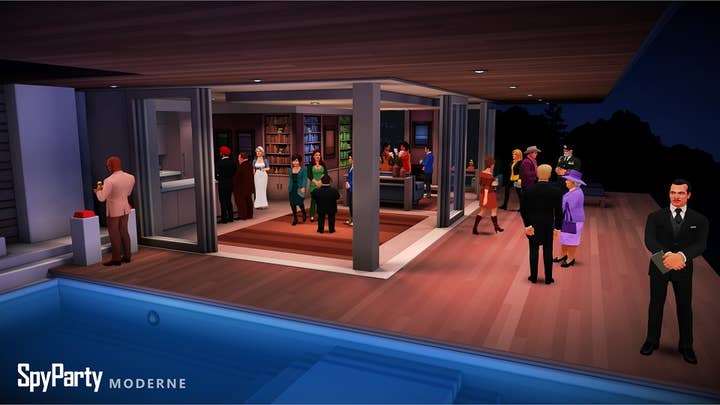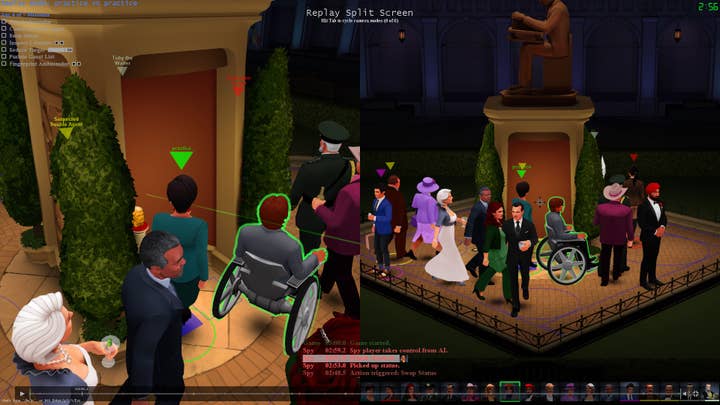Chris Hecker finally throws his SpyParty
Spore designer discusses his hopes and fears about the imminent Early Access launch of his inverted Turing test game after eight years of full-time development
It's a big week for Chris Hecker. Tomorrow marks the Steam Early Access launch of SpyParty, a game he's been working on full-time eight years, and first conceived at a game jam a few years prior to that.
Speaking with GamesIndustry.biz recently, Hecker was transparently apprehensive about the launch.
"It's weird to be 47, have a kid who I was holding in my arms as a toddler at the indie game jam when I came up with the idea... She was six when I went full-time, which is terrifying. She's 14 and a freshman in high school now. It's weird to me. I'm a father and 47 and have a mortgage in the Bay Area, and literally have no idea what my life is going to be like in 30 days. There's a wall of mist on [April] 12th."
Before starting full-time work on SpyParty, Hecker was an engineer and designer at Electronic Arts/Maxis on Spore. He'd been saving up his money to go indie when a round of layoffs accelerated the timeline on that move. That nest egg helped fund SpyParty's development, as did the decision to sell beta access to SpyParty for $15 about five or six years ago, before Steam launched its own Early Access program and made the concept ubiquitous. And while the 24,000 copies he sold directly through the game's site like that helped pad the coffers, Hecker said his savings are now basically gone.
That said, his apprehension is not entirely--and possibly not even primarily--financial in nature.
"I can program a computer and I live in the Bay Area," Hecker said. "So I'm not going to starve even if the game sells zero copies on Steam. I'm going to be OK, which is one of the things that helps mitigate the anxiety a little bit. But 10 years of creative output... It's nerve-wracking."
"My motto on Spore was, 'overdeliver late.' It drives producers mad, but it means cool stuff comes"
So what's taken so long? Hecker pointed to a number of reasons, one of them a slowness somewhat fundamental to how he works.
"I take a long time to do things, but I try to do a really good job when they finally come in," Hecker said. "My motto on Spore was, 'overdeliver late.' It drives producers mad, but it means cool stuff comes."
Second, Hecker said he's prioritized his health, doing his best to spend quality time with the family and avoid becoming another cautionary tale about an indie developer who drove themselves into the ground. His current anxiety about the impending launch aside, Hecker reckons he's done a good job on that front.
Third, and perhaps most importantly, designing a game like SpyParty just takes time.

"It's related to the whole [saying] about nine women can't make a baby in one month," Hecker said. "There are just some things you can't rush, and with a really subtle, complicated design, there are advantages to being able to like, be in the shower three months later without having worried about it, and then going, 'Oh right that's a good solution to that problem.'"
So what makes SpyParty so subtle and complicated? The game is a sort of reverse Turing test; it's a competitive one-on-one game where one player tries to blend in at a party of AI controlled characters, and another watching the party from afar tries to guess which party guest is secretly human. To add a bit of tension to the proceedings, the party-going player is a spy who must accomplish missions while staying undetected; the observing player is actually a sniper who must eliminate the spy with a single bullet.
"Counter-Strike didn't become an esport because Valve threw a bunch of money at it. It became an esport because the game worked that way"
Even a decade after conception, it's a novel enough premise that calls for a multitude of minute design decisions with few obvious implementations or existing models to follow.
"You've got assumptions about how things work," Hecker explained. "And if you're doing an esporty, competitive, super hardcore depth-oriented game, it just takes a long time. It took a long time for players to get better than me, and they're now infinitely better than me. My top players have like 20,000 games and thousands of hours of playtime. That just takes a while to do. So what I've been doing is learning how to make this game. Listening to the game, emphasizing the things it does well, and de-emphasizing the things that aren't working."
One of the things that seemed to work was the competitive aspect of it, as Hecker spoke excitedly of seeing players evolve their tactics in unexpected ways. For example, Hecker said one player noticed that spies rarely talk first when they enter a conversation at the party, perhaps thinking it would conspicuous to do so. The behavior was so ingrained among spies that the sniper began highlighting anyone talking second in a conversation as suspicious. Should that strategy become too effective, it would be reasonable for spies to begin talking first deliberately, engaging in the more "conspicuous" behavior simply because human spies would presumably be more discrete than that and setting up a "yomi" game of trying to read the opposition.
To foster that sort of back and forth, Hecker has devoted a considerable amount of time to the game's replay and spectator system. SpyParty lets players load up a replay of a game, see the entire match play out from the viewpoints of both the spy and the sniper (in split-screen, if desired), and jog the action back and forth in slow motion.
A failed spy can go back and see what they were doing when the sniper marked them as suspicious, and a sniper can look for the subtle cues they might have missed the first time through. The replay mode even lets snipers "practice" against a replay of another user's game. Eventually Hecker wants to surface replays in such a way that one could search for all the matches of a specific player as a spy on a specific map, a seemingly ideal option for pros looking to scout the competition or aspiring players looking to test themselves against the best.
Interestingly, Hecker's efforts on the esports front have been limited to the game's design. Whatever leagues or tournaments have happened have been organized and driven by the players themselves.
"You've got all these big companies trying to force their games to become esports by throwing money at the problem, and I think esports tend to evolve," Hecker said. "Counter-Strike didn't become an esport because Valve threw a bunch of money at it. It became an esport because the game worked that way."
This isn't the only area where SpyParty's community has been doing some of the heavy lifting. Hecker said he's been too busy making the game to do too much legwork beyond simple community management on the beta forums. The game's Discord community was set up by players who then turned it over to Hecker, and even the people streaming the game on YouTube or Twitch are doing so on their own dime. As of late last month, Hecker had yet to give out a single key to a streamer. Understandably, Hecker had nothing but great things to say about the game's community.

"If you went on right now with zero games, there'd be somebody with like 4,000 wins in there and they'd offer to help you learn how to play," Hecker said. "That just does not happen in DOTA."
That said, Hecker knows the jump to Steam Early Access has the distinct potential to change the tenor of the community.
"Now the question is once the multiplier on that organic growth grows really big, once it goes on Steam Early Access, what happens to the quality of the community? I don't know the answer, and that's one of the scary things. It is all organic, which means it's not under my control, so we'll see what happens."
Hecker's hoping that when the game launches, those 24,000 early supporters will be all-hands-on-deck to help new players and set good examples. He's also hoping SpyParty attracts "a bit more mature, chill Steam community" than the typical game built on blowing stuff up. Add that to the list of big questions that will start to be answered when the game launches tomorrow.
Right now, Hecker sees four general possibilities for the launch. Maybe it's a big hit, in which case "hooray," but he has server meltdown issues to deal with. Maybe the early numbers are strong enough that the game's clearly going to be successful, and he can hire someone to help out with development. Maybe it stumbles at launch, and he focuses on post-launch updates to help turn the game's fate around (he named Rainbow Six Siege, Subnautica, and Slay the Spire as inspirations in that event). Or maybe 24,000 people was the game's entire addressable market and the Steam launch arrives to exactly zero additional sales.
"In all those cases, I'm super proud of the game," Hecker said. "The game people are playing at elite levels is the game I wanted to design. Not exactly the same because things change over eight years, but it feels like the game. It's a deep, competitive game about subtle human behavior."
So whether or not SpyParty is widely appreciated, Hecker already seems to be creatively satisfied with how the game turned out. Whether that leads to commercial satisfaction remains an open question, even on the eve of the game's launch into Early Access.
"This is part of the reason I'm nervous," Hecker said. "Things have changed so much since I started. Back in the Braid, World of Goo, Castle Crashers days, if you made a good game, you were basically guaranteed to sell hundreds of thousands of copies. That's not true anymore. So I would be very hesitant about giving advice."
As for what's next, one might think Hecker would be eager to move on to a smaller, shorter project after spending eight years full-time on SpyParty. However, the designer said there's plenty he wants to add to the game, whether it be the aforementioned replay searching, multiplayer modes with extra snipers and/or spies, or some features that would allow him to explore machine learning techniques within the context of SpyParty.
"I don't let myself think about the next game very much," Hecker said. "The way SpyParty worked was this very organic evolution. Take this kernel of something cool, go really deep on it, and see where it goes and listen to it. I think I would do the same thing again, and whether it becomes another 10-year game or something shorter, I don't know. It depends on how the idea evolves."

